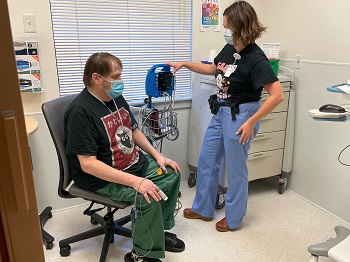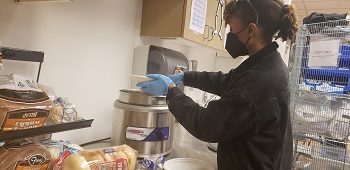Donors Help Bailey-Boushay House Provide Holistic Care and Essential Needs to Outpatient Clients
 Client Nicky has his blood pressure taken by nurse Anne.
Client Nicky has his blood pressure taken by nurse Anne.
When Bailey-Boushay House (BBH) opened its doors in 1992, HIV/AIDS was the leading cause of death for American men aged 22-44. During the first few years, BBH mostly provided palliative and end-of-life care.
But slowly, medicine advanced and our understanding of the disease grew. Some medications were allowing people to live for years, sometimes decades after their diagnosis.
Seeing a new need – to support people living with HIV/AIDS – the BBH team launched an outpatient program. Today, our outpatient program helps about 350 individuals manage their medications, connect to other support services and understand their overall health. Like many of BBH’s programs, donors provide essential funding that help ensure staff have the resources and quality time to give to each client.
“Our social workers and nurses help clients manage their medications so that they take them consistently and there’s never a gap in their care,” director of BBH’s outpatient program Katie Hara, says.
For BBH Executive Director, Rob Hays, providing highly personalized care – like medication education and psychiatry services – is the outpatient program's greatest success. Being open seven days a week, eleven hours a day, means that people can get their morning medications, evening medications or both. Also, on staff are physical and occupational therapists, a dietician, and nurses who help with things like wound care.
 Serving breakfast at BBH
Serving breakfast at BBH
“These medications are complicated to manage. Because of donors, we’re able to provide our clients with truly individual care,” Rob says. “The result is, we can watch for signs of illness and do what we can to prevent it. That’s what health care should be – keeping people as healthy as possible.”
Katie describes the outpatient program as being the front door for an array of services.
“Many of our outpatient clients are homeless, most need mental health support and some struggle with substance use. The wonderful thing about our outpatient program is that we can meet all of these needs,” she says.
Also available to clients are essentials like laundry services, daily meals and computers.
“On top of the physical and mental health burden, HIV/AIDS patients live with are stigmas that can make life very lonely,” Rob says.
When the BBH team designed the program, accessibility and fostering a place for people to build social connections was essential. Outpatient clients have the support of BBH’s spiritual care team. A local artist leads an art therapy group and program managers host games and movie screenings.
For those who are unhoused, the BBH team helps many with temporary shelter with the goal of finding permanent housing.
“We’ve had tremendous success with our outpatient program being the first step toward trusting our team to help with shelter services and then a permanent home,” Katie says. “When people’s medications are stable and they’re getting the psychiatric care they need, we can increase their goals.”
After only a year as executive director, Rob is amazed by the deeply dedicated donors who support BBH.
“Every day, we see donors giving in action – making people’s lives better. We are sincerely grateful for every dollar. Your support makes a world of difference for our clients.”